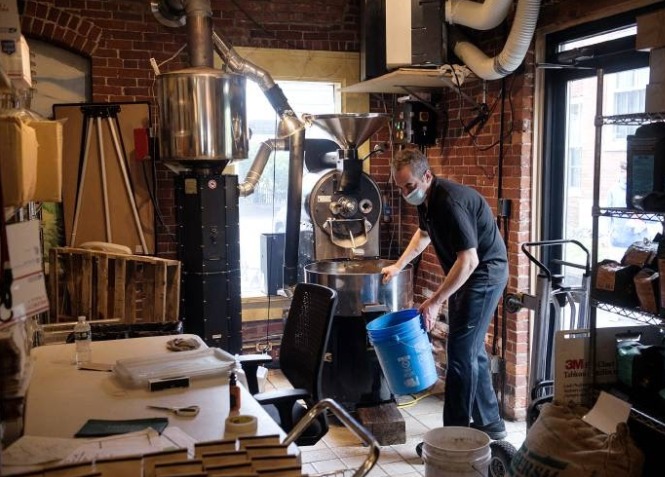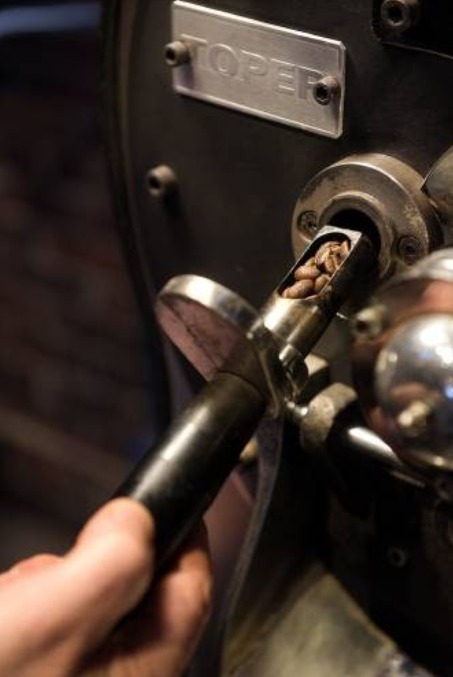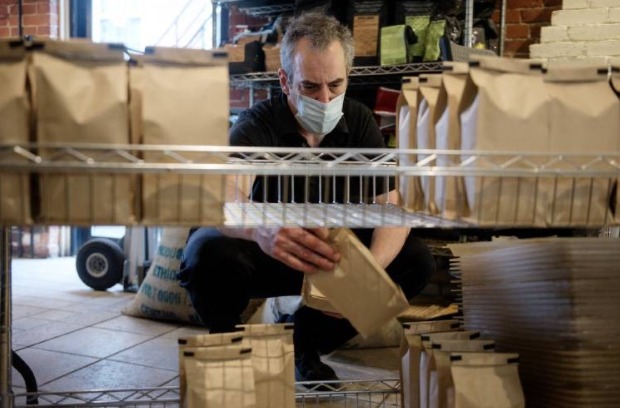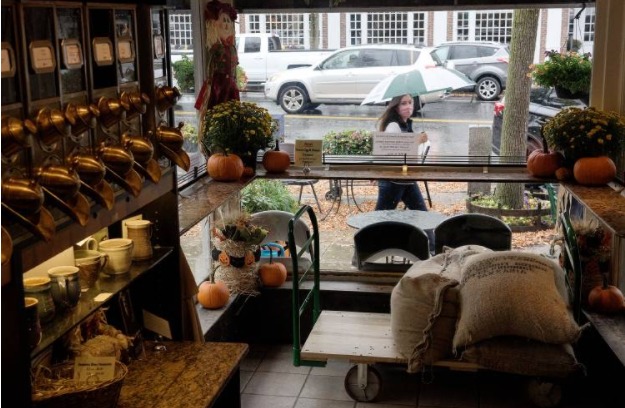
Story Produced by Valley News, a Member of

The coronavirus pandemic has been hard on Upper Valley restaurants, as the fall-off in customers willing to dine in public has forced numerous establishments to close, including at least four in Hanover alone with a fifth on the way.
But COVID-19 brought an unexpected outcome for Dirt Cowboy Cafe, the cafe and bakery kitty-corner from the Dartmouth Green and long a popular breakfast and lunch nook for college students and Hanover residents alike.
“It’s worked out well for us. That sounds crazy, I know,” Dirt Cowboy owner Tom Guerra said last week while he took a break from cleaning the coffee bean roaster machine that has become the engine behind saving his business.

Dirt Cowboy is not doing the level of business it was before COVID-19 erupted earlier this year — few restaurants or bars are — but, thanks to a large jump in online sales of its signature roasted coffee beans, Dirt Cowboy has swung back into the black after a long period of losing money, according to Guerra.
“For two years I had put every one of my own paychecks back into the place to keep it running,” Guerra said. “As soon as the pandemic struck, that stopped. I haven’t put a paycheck back since March 26.”
Dirt Cowboy’s “profile” (as recipes are called in coffee roasting) for pivoting is the result of decisions to cut costs — eliminating time-consuming indoor table service, for one — and tapping a network of Dartmouth alumni who are fans of Guerra’s bean-roasting and have been flooding his online sales platform and email inbox with orders.

Guerra estimates that before the onset of COVID-19, online sales of his coffee beans accounted for about 2 to 3 percent of the cafe’s revenues. Six months into the pandemic, Dirt Cowboy is generating $10,000 per month in online bean sales, 15 percent of its business.
Dartmouth alumni who remember Dirt Cowboy from their time in Hanover are driving much of the online business. For that Guerra credits early social media postings by Liz Klinger, a philosophy and studio art major from the class of 2010, who alerted a Dartmouth alumni Facebook group that closing of the campus in March was having a devastating effect on the cafe.
Klinger, co-founder and CEO of the Oakland, Calif.-based tech startup Lioness Health, which designs and sells a “smart” sex toy with accompanying app, said she was sheltering at home in California during the early weeks of the pandemic and thought, “I’m in need of coffee, so I might as well get coffee I like.”
Klinger lived in an apartment above Dirt Cowboy and would regularly run downstairs to grab her favorite “sugary frappuccino — something that I don’t drink any longer.” (She now enjoys the cafe’s Canoe Club Blend, a combination of African, Latin American and Asian beans described as “chocolatey, semi-sweet, earthy with a touch of roasterly smokiness.”)
After Klinger placed her order she received an email from Guerra — he said he was daily writing emails to customers thanking them for their business as the cafe was down to three employees from its regular 15 — expressing gratitude to her for buying her beans from Dirt Cowboy and explaining all the challenges the cafe was facing.
Klinger said she, as a businessperson, empathized with what Dirt Cowboy was going through.

“It was a really heartfelt message,” Klinger said of Guerra’s email. “So I decided to post screenshot of Tom’s email to one of the Dartmouth alumni groups I’m in, saying,‘I got this message. All the students are gone and if you want coffee you can support this business.’ ”
The post triggered more than 600 “likes” from members, and then the online orders began pouring in. Guerra said online bean orders are averaging $50 per order (to take advantage of free shipping) and he is receiving orders from California, Washington, Minnesota and Texas — and even from an alumna in Hawaii who likes the Kenya AA roast.
“I guess she doesn’t like Kona,” Guerra speculated.
In addition to eliminating indoor seating, which Guerra said he does not plan to bring back even when the weather turns colder and outdoor seating isn’t feasible, he also reduced the menu by 25% and cut back on smoothies and fruit juices. Sales are now up to about 80% of pre-pandemic levels, and seven employees are back full time and three employees part time.
“I’ve been lucky,” Guerra said. “Because this business, 75% was takeout. It’s really geared to takeout. That’s where the silver lining comes in. When we were forced to shut the dining room we found we suddenly became profitable because, it turned out, serving both to-go and for-here meant we needed another person for what was a small gain.”
Guerra said a big share of the transition’s success goes to co-manager Maura Jenks, who has worked at Dirt Cowboy for 18 years.
“She knows everything,” Guerra said. “Not many people have stuck with me. I’m not the easiest person to work for. God bless her.”

Guerra “grew up in the restaurant business” on Long Island in New York where his parents, immigrants from Italy and Germany, owned and ran restaurants. He’s been working in them, he said, since he was 5.
Initially, however, Guerra did not think he was going to follow in his parents’ footsteps.
After graduating from Columbia University with a degree in English literature, Guerra went off the University of Michigan Law School, ranked as one of the top law schools in the country along with Harvard, Yale and Stanford, but he dropped out before the end of his second semester.
After several false starts, Guerra came to Hanover in 1993 looking for a place to open a cafe and found the corner location, which had had a succession of commercial tenants over the years but none that had lasted for long.
“The betting along South Main Street was how long was I going to be here,” Guerra said.
Guerra chose the name “Dirt Cowboy” from the 1975 Elton John autobiographical album, Captain Fantastic and the Brown Dirt Cowboy, about the musician’s early years of wandering before success, which Guerra likens to his own making in the world.
Despite Dirt Cowboy establishing itself as a landmark in downtown Hanover and, after 27 years, one of South Main Street’s longest-running businesses, Guerra said that in the couple years before COVID-19 “the business was struggling” and sales were falling.
“I was not so happy, honestly, the last few years owning this place,” he said.
But, strangely, the pandemic changed his outlook — and he attributes that to how the community responded when COVID-19 struck.
“The pandemic brought all the beautiful things out,” Guerra said. “I began slowing down where I could talk with customers and enjoy actually the serving of the coffee again, which is what I like to do.”
“People would buy a $3 coffee and leave a $100 tip in the cup. That happened on a regular basis,” Guerra said of the early days after the pandemic hit.
Now Guerra is planning other changes.
Already introducing a new website with a more robust online sales platform, he will be adding large, flat-screen monitors on the wall behind the counter for an electronic menu. And he plans to move the entire kitchen from the basement level to the former table seating area, where he has brought his coffee roaster from the shed at his Norwich home.
The idea, Guerra said, is to have an exposed kitchen so customers can see dough rolling and baking in action. Moving the kitchen upstairs will also eliminate the countless trips up- and downstairs all day for staff between the two floors.
“We stumbled into this but quite honestly the pandemic has turned into nothing but a cure for what was ailing this business,” Guerra said.
 These articles are being shared by partners in The Granite State News Collaborative. For more information visit collaborativenh.org.
These articles are being shared by partners in The Granite State News Collaborative. For more information visit collaborativenh.org.







